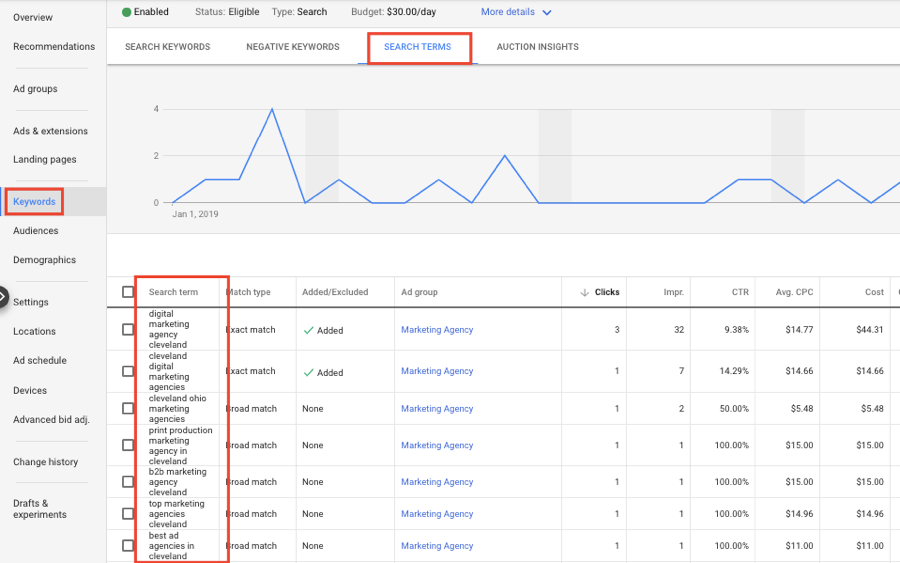People think of SEO and PPC as two different beasts. They don’t realize the benefit your PPC campaigns can have on your SEO strategy.
Your business can utilize your Google Ads data to bolster your search engine optimization by taking the following steps:
- Analyze your search terms report with Google Ads
- Find queries within your search terms report that drives conversions
- Find search terms that the business owner or marketer deems relevant (even if they don’t drive conversions)
- Implement search terms on your website on relevant pages
Importance of Long-Tail Keywords
Ahrefs analyzed 1.9 BILLION keywords in Ahrefs’ US database and found that a whopping 92.42% of them get ten searches per month or fewer.

Thanks to Ahrefs for this great chart showcasing the amount of queries that get ten search per month or fewer
What does this mean for your business? People don’t just search for “Marketing Agency”. They search for “Marketing Agency in Cleveland that focuses on local SEO”.
According to Ahrefs, Long-tail keywords are “unpopular” (i.e., low volume) yet the highly-focused search queries tend to convert exceptionally well.
If you are using an SEO reporting platform like Moz or SEMRush, they rarely have good data on long-tail keywords so marketers overlook the importance of this.
The search terms report within Google Ads is the perfect place to do market research on your business. It is the exact terms people are typing into Google to go to your website. Yet this is often overlooked when implementing an SEO strategy.
Search Terms Report
Search terms within Google Ads is the official source of truth for how well your traffic quality is from pay-per-click advertising. The first thing our digital agency does when taking on a new PPC account from a prior agency is dig into the search terms report. If queries are solid and controlled, that’s a good sign. This isn’t often the case and can be a big eye-opener for businesses investing money in Google Ads.
Finding the search terms within your Google Ads account is very simple. You click on “keywords” within your campaign or ad group and click on the “search terms” tab and it’ll give you golden nuggets to catapult your SEO.
Below is an example of some of the search terms within our campaign for ‘digital marketing agency’. In one instance, someone searched for “Print Production Marketing Agency in Cleveland.” That’s not relevant for our business so I’d put, “Print Production” as a negative keyword.

All of the other search terms are very relevant and give me a good idea of what people are actually searching for. These could be queries that I add onto the homepage of our website for more keyword diversification, which would enhance the semantics of our site.
Get Started
Utilizing the search terms report for SEO has been a game changer for our SEO Agency. Even though there are fancy tools that can give you keyword data, these tools miss out on the queries that get fewer than 10 searches per month or fewer, which is the majority of searches. Make sure that when you add these new search terms onto your website, you track them in tools like Moz or SEMRush so you can see where you rank on Google for this.
Don’t forget folks, your PPC campaigns provide you with such great data – data that can leverage your SEO strategy!
Image Credits
Feature Image:Unsplash / rawpixel
All screenshots taken by author, February 2019.
Image 1: via Ahrefs
Image 2: via Google Ads



